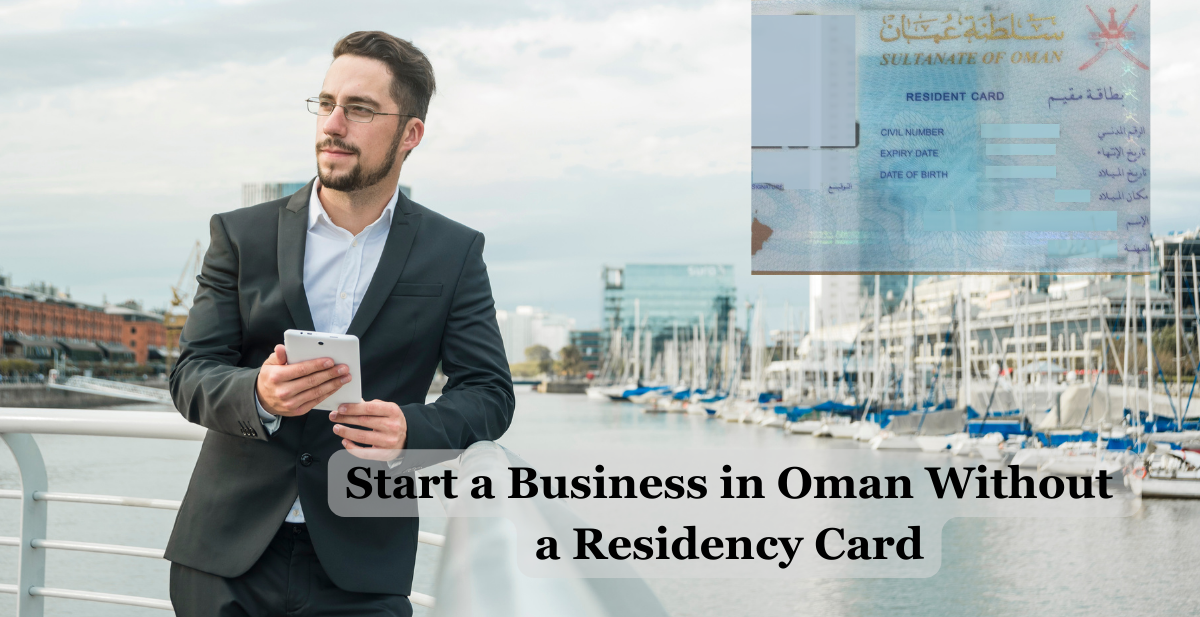Starting a company in Oman without a residence card is challenging but achievable. Foreign entrepreneurs starting a firm in Oman must follow specific rules, like many others. This detailed blog covers the essentials to set up a business in Oman without a residence permit.
1. Legal Overview
Before you start a business in Oman without a residency card, understand the foreign investment laws. Oman’s legal system allows single proprietorships, partnerships, and LLCs. The LLC form is famous for its flexibility and liability protection.
Foreign businesses must learn Omani ownership requirements to comply with legislation. Understanding the law is essential for a successful company.
2. Finding a Local Sponsor
Foreign entrepreneurs need an Omani sponsor, a citizen or a corporation controlled by Omani citizens. The local sponsor is crucial in acquiring permissions and licenses and owns at least 30% of the firm.
This alliance is the foundation of the company relationship; therefore, choose a reliable local sponsor. The selection process should comprise rigorous study and due diligence to guarantee a dependable and mutually productive partnership.
3. Selecting a Business Activity
Establishing a company requires choosing a suitable activity. Foreign firms in Oman must follow specific rules. Research and legal assistance are needed to choose a suitable business activity and get government permission.
Entrepreneurs must follow Omani rules and overcome intricate regulations in some fields.
4. Business Registration
Registered businesses must submit the memorandum of association, articles of association, and business leasing agreement to the Ministry of Commerce and Industry. While the procedure may appear simple, a local business setup consultant or legal specialist may help overcome registration complications.
Registration establishes the firm legally and starts operations in Oman.
5. Getting Approvals and Licenses
Obtaining permissions and licenses is complicated. Depending on the company, it requires commercial registration, municipality licensing, and ministry authorization. Planning and monitoring regulatory changes are essential for this process.
To minimize delays in company launch, planning and regulatory compliance are crucial due to the length of approvals.

6. Bank Account Opening
The next crucial step after company registration is creating an Oman bank account. This requires submitting business registration, leasing agreement, and local sponsor identification. Entrepreneurs should compare banks to select one that meets their financial demands.
Business transactions, wage payments, and financial administration need a solid bank account. Entrepreneurs should follow banking standards and choose a partner with the right services and assistance.
7. Tax and compliance requirements
Business owners must follow Oman’s tax laws. Oman has corporate taxes; therefore, enterprises must be careful. Accurate financial records are essential for audits and tax compliance.
A local accountant or tax adviser may help assure tax compliance and seamless operations within Oman’s legal and financial framework.
8. Handling Immigration Rules
Business owners may not need a residence permit, but addressing immigration rules is essential to living in Oman. Responsible company management requires employee visas and immigration compliance.
Entrepreneurs should research immigration regulations and engage with authorities to meet all criteria for a seamless and lawful operation.
9. Connecting Locally
Starting a business in Oman depends on local ties. Networking with other company owners, joining industry groups, and attending local events boosts reputation and growth.
Respect for Omani traditions and culture helps create partnerships. Entrepreneurs should learn Omani traditions and etiquette to advance in the business world.
10. Adjusting to Culture
Doing business in Oman requires cultural awareness. Learn Omani cultures and traditions, entrepreneurs. This cultural understanding streamlines corporate processes and shows a genuine commitment to being a responsible and valued business member.
Adapting to cultural norms entails more than legal compliance; it involves creating solid connections and helping the local business environment.
11. Overcoming Language Barriers
Entrepreneurs should learn Arabic even if English is extensively used in business. Arabic is the official language, and although many commercial transactions are in English, knowing Arabic might aid with daily conversation.
Learning essential Arabic words and expressions helps improve business relationships with local stakeholders.
12. Following Omani Business Hours and Workweek
The weekend is Friday and Saturday in Oman, which works Sunday to Thursday. Meetings, transactions, and timely contact with government agencies and business partners need knowledge and adherence to local business hours.
Respecting local work culture and scheduling boosts professionalism and credibility in the Omani business community.
13. Stressing CSR
In Oman, corporate social responsibility is becoming more significant. Community projects, supporting local issues, and encouraging sustainability may boost the company’s image and strengthen partnerships with local authorities and the community.
Adding CSR to the company strategy fits Oman’s rising focus on sustainable and responsible business.
14. Monitoring Economic Trends
Global and regional factors affect Oman’s economy. Entrepreneurs should monitor economic, commercial, and regulatory developments affecting their firms. Monitoring economic statistics and market reports may aid strategic decision-making.
Businesses must adapt to shifting economic circumstances to survive and flourish.

15. Utilizing FTAs
Oman has signed many FTAs that favour international commerce. Understanding and using these agreements may save firms money and market access. Entrepreneurs should consider how FTAs fit their firm and seize their potential.
Businesses may maximize the advantages of free trade agreements by joining trade groups and getting expert assistance.
16. Strong Cybersecurity
As organizations increasingly use digital technology, strong cybersecurity measures are needed to secure sensitive data and preserve customer and partner confidence. Omani cybersecurity rules and international best practices must be followed to protect the firm from cyberattacks.
Working with cybersecurity specialists and investing in safe technology may reduce risks and boost company resilience.
17. Ongoing Training
Keeping up with industry developments and improving skills is continual. Entrepreneurs must invest in professional development to be competitive and inventive. Workshops, conferences, and industry forums provide networking and learning from peers and professionals.
Continuous learning benefits entrepreneurs and helps businesses grow and innovate.
18. Digital Presence
Businesses need a solid online presence in the digital era. Entrepreneurs should invest in a quality website, social media, and digital marketing. A solid online presence boosts visibility, expands reach, and improves consumer engagement.
Businesses may benefit in Omani markets by adopting digital trends and internet tools.
Conclusion
Business setup in Oman without a residence card needs strategy, legal compliance, and knowledge of the local business scene. Despite the challenges, foreign enterprises may succeed in this economically active and culturally diverse nation with the correct direction and compliance with Omani law. To guarantee a smooth and legal business setup in Oman, get expert help at every stage. For more details, reach out to us www.bizvirtue.ae | info@bizvirtue.ae | +971 45 70 9205 | +971 54 793 5540





